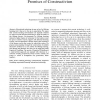Free Online Productivity Tools
i2Speak
i2Symbol
i2OCR
iTex2Img
iWeb2Print
iWeb2Shot
i2Type
iPdf2Split
iPdf2Merge
i2Bopomofo
i2Arabic
i2Style
i2Image
i2PDF
iLatex2Rtf
Sci2ools
JCP
2007
2007
Lifelong Learning, Empirical Modelling and the Promises of Constructivism
—Educational technology is seen as key for lifelong learning, but it has yet to live up to expectation. We argue that current learning environments are typically oriented too much towards structured learning to meet the needs of the lifelong learner. Environments for lifelong learning demand a higher degree of autonomy for the learner, must be open to eclectic sources, support soft informal learning activity, and accommodate evolution both in the experience of the learner and in the context in which this occurs. We propose sense-making through the construction of suitable interactive artefacts as a core activity for lifelong learning, and discuss and illustrate how this can be supported using Empirical Modelling. The merits of Empirical Modelling as a constructivist approach are assessed with reference to a criterion recently proposed by Bruno Latour, namely, the extent to which it strengthens five guarantees, taken together.
Related Content
| Added | 15 Dec 2010 |
| Updated | 15 Dec 2010 |
| Type | Journal |
| Year | 2007 |
| Where | JCP |
| Authors | Meurig Beynon, Antony Harfield |
Comments (0)

